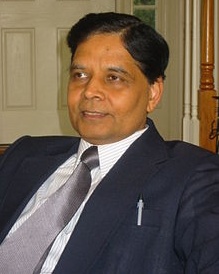Niti Ayog chief Panagariya quits, prefers US academia
02 Aug 2017
Niti Aayog Vice Chairman Arvind Panagariya today said would leave the government think tank on 31 August and return to Columbia University.
 Talking to reporters in New Delhi, Panagariya said he was leaving as the university was not giving him further extension. He said that about two months ago he had expressed his desire to Prime Minister Narendra Modi to be relieved by 31 August.
Talking to reporters in New Delhi, Panagariya said he was leaving as the university was not giving him further extension. He said that about two months ago he had expressed his desire to Prime Minister Narendra Modi to be relieved by 31 August.
The 64-year old Panagariya, professor of Indian Political Economy at Columbia University, did not have a fixed term at Niti Ayog.
Panagariya said he had to make a choice as if he delayed, it would not be possible for him to get back the job he had been doing at Columbia University.
"If I were at 40, then I would have got job anywhere ... the kind of job I have at Columbia is almost impossible to get at this age," he said.
The Indian-American became as the first vice chairman of Niti Aayog in January 2015. Its first part an acronym for National Institute for Transforming India, Niti Ayog was established to replace the Planning Commission, a Nehruvian legacy which was scrapped by the Narendra Modi government in one of its first moves.
Panagariya is the second high profile economist after popular former Reserve Bank of India Governor Raghuram Rajan to return to American academia.
Although sections of the media say Rajan 'quit under similar circumstances', Rajan, an appointee of the previous Manmohan Singh government, in fact did not resign but had to leave as the Modi government did not give him an extension of his three-year term last year.
Going back to Chicago University, Rajan though made it clear that he would like to have continued as he had not finished what he had set out to accomplish at the RBI.
Less than smooth sailing?
Although Panagariya said, "I have always shared good relations with Reserve Bank, finance ministry and Prime Minister's Office," observers read more into his resignation than a desire to hold on to his university job.
Unlike Rajan, he was a staunch supporter of Prime Minister Narendra Modi's vision. Reports, however, say there were provocations from outside and within the organisation that cut short his stint after a little over two-and-a-half years.
As The Indian Express noted, several right wing groups, led by the powerful the Rashtriya Swayamsevak Sangh (RSS) which is virtually the parent body of the ruling Bharatiya Janata Party, were unhappy with the way Niti Ayog functioned under Panagariya.
The most dissatisfied among these bodies was the Swadeshi Jagran Manch (SJM), the "economic wing" of the RSS, which is opposed to the introduction of genetically-modified (GM) crops, a proposition the Niti Ayog favours. Its other complaints included the Niti Ayog's plan to introduce taxation on farm income as well as its intervention in pricing of medicines and other medical products. SJM criticised its moves as being anti-poor and for being hand in glove with the corporate lobby.
It also organised a seminar this year to review the Niti Ayog's functioning, as The Print reported, where several policies formulated by the think-tank was torn to shreds.
For his part, Panagariya spoke out against the crackdown on honest citizens by the income tax department after demonetisation last year. He emphasised the need to exempt people, especially women, who want to deposit up to Rs2.5 lakh in cash from any scrutiny.
He also recommended the privatisation of a number of government enterprises, including Air India, helped the Centre do away with a separate railway budget, and outlined a plan to move from revenue expenditure to capital expenditure.
Many of these ideas did not sit well with the Bharatiya Janata Party (BJP)-led government and its affiliates. According to Huffington Post, the lack of agreement was palpable when Panagariya told the G20 summit last September that India wasn't ready to ratify the Paris agreement on climate change in terms of "domestic action" -- only for the PM to go ahead and contradict him in a public statement on 2 October.
Panagariya also differed on the proposal of introducing universal basic income scheme put forward by Chief Economic Adviser Arvind Subramaniam. "At the current level of income and our needs for investment in health, education, infrastructure and defence, we simply do not have the necessary fiscal resources to transfer a reasonable basic income to 130 crore Indians," he told The Indian Express earlier this year.
Even within the Niti Ayog, the creation of several power centres headed by different personalities often led to conflicting opinions, which cannot have been pleasant for Panagariya.
Wise decision: Chidambaram
Senior Congress leader and former union finance minister P Chidambaram had a different take on Panagariya's resignation, saying it was a ''wise decision'' as it was taken well before he was proved wrong for predicting that growth in Q4 of 2017-18 would touch 8 per cent.
"After predicting that growth in Q4 of 2017-18 will touch 8%, Mr Panagariya has wisely resigned before proved wrong," Chidambaram tweeted on late Tuesday night.
Going by the convention followed by the erstwhile Planning Commission which was replaced by Niti Aayog, Panagariya's term was to be co-terminus with that of the Prime Minister, who is the chairperson of the body.
Padma Bhushan
Panagariya, a close associate of noted trade economist Jagdish Bhagwati, was honoured with Padma Bhushan, the third highest civilian honours India bestows in any field, in March 2012.
He holds a PhD Degree from Princeton University and has worked with the Asian Development Bank, World Bank, International Monetary Fund and UNCTAD in various capacities.
On his tenure at the Niti Aayog, Panagariya said although it was tough initially, once he got into the groove, it had been a smooth sailing.
Panagariya said he took comfort from the fact that during his tenure a new institution had taken roots and would continue to steer the economy into a higher growth trajectory.
Among other achievements, he said, the Niti Aayog has been able to push privatisation, especially of sick units and Air India, prepare the ground for reforms in several sectors including medical and higher education, and develop a good working relationship with states.
He further said although he wanted to complete a Seven-Year Strategy Paper and 15-year Vision Document, the task would now have to be done by his successor. These documents, he added, were 80-85 per cent ready.
On his successor, Panagariya said he has no one in mind nor was he going to suggest any name to the government.
Panagariya also said that he would be writing a sequel to his India: The Emerging Giant, which was published in 2008.

















